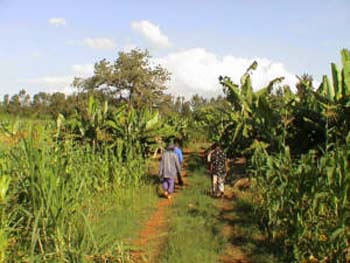Publishing House intern program nurtures African students A UMNS photo by Kathy L. Gilbert
African seminary students surround the Rev. Fred Allen (third from right) in front of the United Methodist Publishing House.
African seminary students, Emmanuel Naweji (from left), Nsenga Gad Mpoyo, Newlove Annan, Okitakoyi Lundula, Wilson Marimi and Dominic Dadzie surround the Rev. Fred Allen (third from right), executive director of African American Initiatives/International Outreach at the United Methodist Publishing House in Nashville, Tenn. They are the first in a new African Internship Program created to nurture seminary students interested in a career in Christian publishing. With Allen as their mentor, the students spent June 12-30 learning about the industry from Publishing House staff. A UMNS photo by Kathy L. Gilbert. Photo #06758. Accompanies UMNS story #413. 7/11/06
July 11, 2006
A UMNS Feature
By Milse Furtado*
NASHVILLE, Tenn. (UMNS) - Six seminary students from three African countries got more than they bargained for after a summer internship at the United Methodist Publishing House.
And so did staff at the Nashville United Methodist agency.
At an emotional chapel service to say goodbye June 29, it was evident students and staff had made lifelong friendships.
The six students were the first in a new, three-week African Internship Program created by the Publishing House to find ways to nurture seminary students interested in pursuing a professional career in Christian publishing, marketing, merchandizing and distribution.
"This is really one of our most exciting programs," said the Rev. Fred Allen, executive director of African American Initiatives/International Outreach at the Publishing House. Allen also served as mentor for the young students.
Emmanuel Naweji
Emmanuel Naweji
"Almost throughout their lives in Africa, the interns had to live on the edge of social and political unrest, thus having to overcome some overwhelming odds that would have broken lesser persons," he said.
"As they shared their powerful testimonies of faith with the United Methodist Publishing House family, we were profoundly inspired by their deep commitment to God through Christ and their love of the United Methodist Church."
Life-changing experience
"My experience at the Publishing House was more than a learning experience, and it was also a turning point of my life," said Emmanuel Naweji, a native of the Democratic Republic of Congo and a student at Garrett-Evangelical Theological Seminary, Evanston, Ill.
"My dreams have been redirected. I actually dream of pursuing a doctorate program so that I will be able to combine church and development of African communities through writing, teaching and preaching."
"Being here for these past three weeks was a life-changing experience in many ways," said Nsenga Mpoyo, also from the Democratic Republic of Congo and a student at Candler School of Theology, Atlanta.
Nsenga Mpoyo
Nsenga Mpoyo
"I came to have a deep sense of what it takes to get from an idea to a finished product ready to be published," he said.
"At the United Methodist Publishing House we learned the art of hospitality, love, unity, hard work, commitment and quality," said Wilson Marimi of Kenya, a student at Gammon Theological Seminary, Atlanta. He said the students witnessed the staff's "love of God individually and collectively."
"We were blessed more than mere words can be able to describe," he said.
Allen said these first six students were chosen based upon recommendations from the deans of the schools of theology.
Struggles on the journey
The students had stories of struggle and triumph that they shared during their June 12-30 stay in Nashville.
"I always pray to God not to remove any mountain in front of me, but I rather ask him to strengthen me to climb whatever mountain that is in front of me," said Newlove Annan of Ghana, a student at Gammon.
Okitakoyi Lundula
Okitakoyi Lundula
The other students participating in the program were Dominic Dadzie, Ghana, attending Candler; Nsenga Mpoyo, Democratic Republic of Congo, attending Candler; and Okitakoyi Lundula, Democratic Republic of Congo, attending Garrett-Evangelical.
Mpoyo, who was born and raised in a Christian environment, joined the church at age 15.
He decided to stop medical school after three years because he knew it was not what he was called to do. "This was the hardest decision I ever made in my life," he said. He moved to Zimbabwe and got his bachelor's degree in divinity from United Methodist-related Africa University in Mutare.
Naweji said he always knew he was called for ministry. His mother used to have evangelists come over for prayer meetings, and they would tell her "this boy is called for ministry."
However, two months before his dream of studying abroad became reality, his father died of poisoning. After an uncle introduced him to Africa University, he graduated with a degree in agriculture and business. Then he enrolled in seminary in the United States.
"I want to be a teacher someday and be able to write books so that we can also express our African beliefs. and Christian culture to the rest of the world," said Naweji.
God calling
Wilson Marimi
Wilson Marimi
Born to a farmer family, Marimi was named "Mugambi" by his grandfather, which means "spokesman and judge in a council of elders."
While studying at Moi Teachers College in Kenya, Marimi heard God calling him one night.
"I went to sleep at around 1 a.m., but two hours later, I heard a voice calling, 'Mugambi! Mugambi! What are you doing?' I woke up thinking it was my roommate who was calling me, but I realized he was dead asleep. I went to sleep again, but after 30 minutes, the same voice called me again. I woke up, but there was nobody I could see. I went back to sleep, and the same voice called again. 'Mugambi! Mugambi! What are you doing?' I realized it was God who was calling me. I just said, 'God, if you are the one calling me, use me where others have been defeated.'"
The son of a district lay person in the Democratic Republic of Congo, Okitakoyi Lundula has always pursued a ministry of music. Singing in the church and in the family choir made him a better Christian, he said. "That's how I started knowing God - not in the Bible but through songs."
Known among peers as "reverend, pastor, and bishop," Lundula is pursuing a master's degree in divinity.
Dominic Dadzie
Dominic Dadzie
Dominic Dadzie was raised in the Catholic Church. His parents fished for a living.
While he was student leader of a military task force, soldiers attempted a coup of the government. Dadzie was not involved in those operations, but some members of the armed forces picked students at random for questioning, he said. In an effort to avoid conflict, he sought refuge in Nigeria. Already aware of a call to ministry nudging, the call became clearer when he decided to enter full-time ministry, returned to Ghana and was ordained in 1991.
"One church tried to get me into the ministry in Nigeria, but I said, 'No, I want to go back to Ghana.' They asked me if I had no fear and I said 'No God will take care of me.'"
He is pursuing a master's degree in theological studies.
True measure of success
Annan grew up in a Christian environment. "I have been in ministry, not ordained, but in ministry ever since I was born, and I was called to the ordained ministry to be a candidate in the year of 2000," he said.
Newlove Annan
Newlove Annan
He received his call through dreams while he was in Ghana pursuing his undergraduate degree in religion and music. "God was telling me to go and do his will and to rely on him totally."
Annan also wants to further his education. "I actually want to go to (the) institute of sacred music at Yale to get a doctor's degree in church music. Right now, I am concentrating on graduating with a dual degree in divinity and sacred music from ITC." Gammon is one of the seminaries that constitute the Interdenominational Theological Center in Atlanta.
"As a result of the African Seminary Interns," Allen said, "(we) have underscored the belief that a true measure of success is not merely a return on the dollars expended on product development and publication of resources, but also a measure of the impact we have on the lives touched by our products and programs, especially in regards to our interns."
*Furtado, an intern at United Methodist Communications, is a senior communications major at United Methodist-related Rust College, Holly Springs, Miss.
News media contact: Kathy L. Gilbert, Nashville, Tenn., (615) 742-5470 or newsdesk@umcom.org.



















